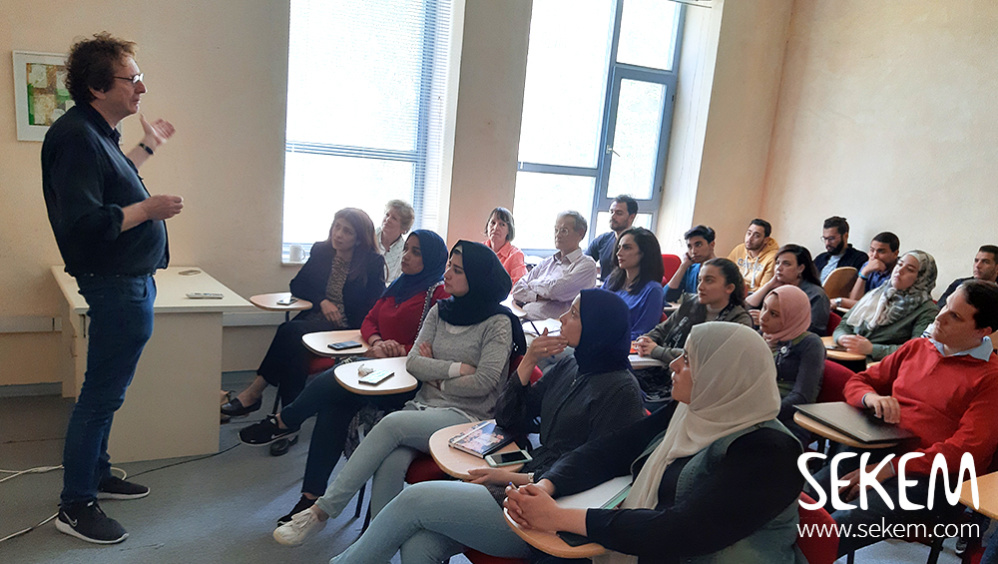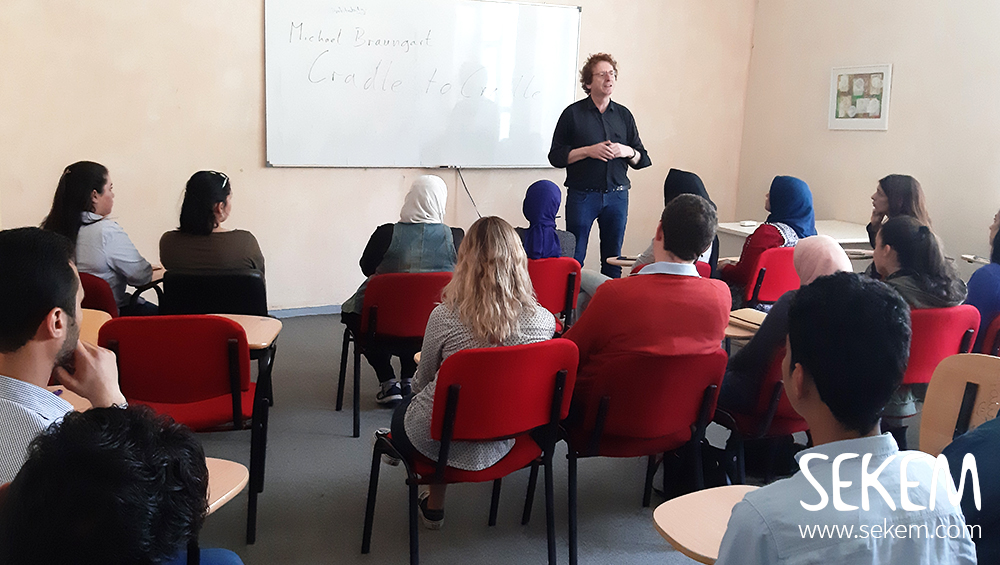Recently, Heliopolis University (HU) was honoured by a visit from Dr. Michael Braungart, innovator in the field of sustainable development and co-founder of the concept of Cradle to Cradle (C2C). He spoke for an interested audience of students and staff in particular from the Faculties of Engineering and Business and Economics. Corien Hoek from the Dutch SEKEM Friends Association summarized the content of his lecture for the SEKEM News.
“Let’s be good instead of just less bad.” Dr. Michael Braungart
In his talk, Dr. Braungart emphasised the need to develop sustainably in a positive sense: “Do not start from reducing bad habits of polluting the air, producing less harmful products or reducing the acts of destroying diversity, but rather stop these harmful activities altogether and find other solutions. Let’s be good instead of just less bad”. He explains that there is no need to think about how to destroy a diminished quantity of harmful particles that remain after using the product, because products can also be designed without these particles. The entrepreneur has to ask key questions first: What’s in my product? What’s next after its use? What resources does it take to make it? At the design stage, the developer already chooses resources that are either biodegradable or have continuous use in other products. This is the concept for Cradle to Cradle design and gives practical leads for the sustainability slogan “use, reuse and recycle”.
Materials as biological or technological nutrients
Dr. Michael Braungart has been active in this field for over 30 years. In 2002, he and his partner William McDonough published the book “Cradle to Cradle: Remaking the way we make things.” In this book, they launched the new idea of looking at materials as biological or technological nutrients. What used to be seen as waste is really input for other products, or food for people, animals, plants or other natural systems. The positive consequence is that human beings will feel proud instead of guilty as they are contributing something good to the system and do not only cause problems as climate change for instance. Besides, C2C makes us all part of the feeding system, creating nutrients for each other. Hence, every new born creature is indeed given a welcome as the more diversity of beings there is, the more material can be nutrients and opportunities for innovative products.

The sustainability expert discusses a new concept of ownership that serves realising the goals of C2C. “You do not need to own washing machines, cars, tv sets and so forth. You only need the service that enables you to wash, drive or watch programmes. If you only buy hours of washing, driving and watching and not pay for the materials (because they are biodegradable or recyclable) the product will be less costly”, he explains. The entrepreneur can thus opt for a higher quality, using better biodegradable and recyclable materials, leaving out the harmful ingredients, that are often a result of keeping costs low.
“If you only buy hours of washing, driving and watching and not pay for the materials the product will be less costly.”
The Cradle to Cradle Products Innovation Institute was established to set a product standard accordingly. This has developed into a certificate given to products that meet the C2C-criteria. It encourages and supports entrepreneurs to embark on this process of innovation and quality in product design.
The audience was inspired by Dr. Michael Braungart’s thinking anew about production, lifecycles, waste and food and about our wellbeing. He concluded his talk by expressing his appreciation for the HU: “The innovation in sustainable development in the HU’s vision is very important for the future.” As professor for Eco-Design at Leuphana University, Germany and at Erasmus University, in the Netherlands, he looks forward to cooperate with the HU through exchange of students and staff as well as knowledge and experience.
Corien Hoek is a member of the SEKEM Friends Association of the Netherlands and supports Heliopolis University twice a year for two months, contributing to the Core Program in the field of sustainable development and Islamic arts.
SEKEM at Cradle to Cradle Congress 2015: For a Positive Footprint
SDG 9: Industry, Innovation and Infrastructure for Sustainable Communities

